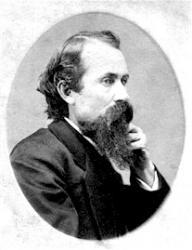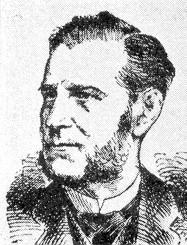Planning worship?
Check out our sister site, ZeteoSearch.org,
for 20+ additional resources related to your search.
- |
User Links
Person Results
Aldine S. Kieffer

1840 - 1904 Person Name: A. S. Kieffer Composer of "TAYLOR" in Children of Zion Full name Aldine Silliman Kiefer
Aldine S. Kieffer
Simeon Grosvenor
Person Name: S. Grosvenor Composer of "JERUSALEM" in The Methodist Hymn-Book with Tunes
Simeon Grosvenor
A. D. Fillmore
1823 - 1869 Composer of "GOING HOME" in The Little Minstrel Fillmore, Augustus Damon. (Gallia County, Ohio, September 7, 1823--June 10, 1870, Cincinnati, Ohio). Minister, Christian Church. Co-editor (with Silas White Leonard, 1814-1870) or Christian Psalmist (1847), which "probably had a more general circulation than any other of his publications." Author of "Come, come, come to the Saviour" and composer of several hymn tunes.
--George Brandon, DNAH Archives
A. D. Fillmore
Henry S. Rupp
1827 - 1898 Person Name: Henry S. Rupp, 1826-1898 Composer of "CANAAN" in Church Hymnal, Mennonite Rupp, Henry S. (Near Shiremanstown, Cumberland County, Pennsylvania, 1827?--January 14, 1898). Ordained as deacon January 17, 1878 and served the Slate Hill congregation.
Additional family history is available in the file on Rupp.
--DNAH Archives
Henry S. Rupp
J. C. Ewing
1849 - 1937 Composer of "IRIS" in The Brethren Hymnody John Cook Ewing (1849-1937), who usually referred to himself as J.C. Ewing, was the pioneer Brethren musician, music teacher and composer. Before providing a synopsis of Ewing’s life and work it is appropriate to identify the Brethren of whom we are speaking, for several denominations have the term Brethren in their names, and to relate the religious and hymnological culture within which J. C. Ewing served.
In the nineteenth century this particular body called themselves The Fraternity of German Baptists and the German Baptist Brethren. Their beginnings in 1708 were in the little village of Schwarzenau, Germany under the leadership of Alexander Mack Sr. (1679-1735). Due to religious persecution of Anabaptists, most of these Brethren emigrated for America by the 1730’s. By the 1880’s the Brethren were divided over several issues: notably whether or not they should be engaged in higher education, have Sunday Schools, participate in evangelistic endeavors, call persons to serve in foreign missions, sing from hymnals with musical notation, and use musical instruments in worship. The controversies led to schism and the establishment of three distinct Brethren groups: the more cautious, conservative parent body which retained the name German Baptist Brethren, a more “progressive” wing known as The Brethren Church, and the ultra-conservatives who referred to themselves as the Old German Baptist Brethren. Today there are several groups which share this common heritage: the German Baptist Brethren (renamed the Church of the Brethren in 1908, with administrative offices in Elgin, Illinois), The Brethren Church headquartered in Ashland, Ohio, The Fellowship of Grace Brethren Churches, Winona, Lake, Indiana (also known for business purposes as Charis Fellowship), the Conservative Grace Brethren Churches International, the Old German Baptist Brethren New Conference, and the Dunkard Brethren Church.
The first Brethren hymnal in America was Das Kleine Davidische Psalterspiel der Kinder Zions (the Small Davidic Psaltery of the Children of Zion), a hymnbook for which early Brethren leaders and the prominent colonial American printer, Christopher Sauer, collaborated for its production in Germantown, Pennsylvania. In 1791 came the fifth edition of the Psalterspiel, and also the first English language hymnal of the Brethren, The Christian’s Duty. With this English language hymnbook began the second of two entirely separate tracks of Brethren hymnals in the nineteenth century. Over the course of the century there was a gradual shift to the English language among the Brethren and the demise of their hymnic heritage and original piety.
During the first half of the nineteenth century the Brethren patterned their worship services according to what they believed to be the primitive church’s inclusions of singing, praying, reading Scripture, and preaching. Congregational hymn singing was “lined” and often led by a deacon serving as song leader (Vorsänger). Hymns were sung slowly and thoughtfully, with every stanza of a hymn sung, and rendered unaccompanied and in unison. Although it was stated at the denomination’s Annual Meeting of 1844 that four-part harmony was not acceptable as well as the use of musical instruments, four-part singing was evidenced in some Brethren congregations.
Brethren hymnbooks in mid-century continued to be printed without musical notation. According to Annual Meeting decisions in 1825 and 1838, Brethren were also prohibited from providing a meeting place for or teaching in “singing schools.” The prohibition was moderated in later meetings (1862, 1874), most likely due to the fact that there was an interest in learning how to sing, and the pioneer Brethren musician traveled as a singing school teacher.
John Cook Ewing, born near Benton, Holmes County, Ohio May 8, 1849, studied music with some of the foremost teachers of that era, including composer George Frederick Root of Chicago. Ewing became a skilled organist, pianist and song leader, a prolific composer of hymn tunes, and a very competent music teacher. Before the divisions of the early 1880’s, he served as the first instructor of music at the Brethren-affiliated Huntingdon Normal School (later Juniata College) in Huntingdon, Pennsylvania. He was entrusted with the 1879 revision of The Brethren’s Tune and Hymn Book (1872), the first Brethren hymnal with musical notation, set with shape-notes. Included were seventeen hymn tunes composed by Ewing.
After the schism J. C. Ewing affiliated with The Brethren Church and was invited to be the first professor of music at the denomination’s newly established institution of higher learning, Ashland College, Ashland, Ohio. He was also called upon to serve as compiler and editor of the first of only two hymnals produced by The Brethren Church, The Brethren Hymnody with Tunes (for Sanctuary, Sunday School, Prayer Meeting, and Home Circle), published by J. C. Ewing in 1884 at Wilmington, Ohio, and set in round-note musical notation. Ewing contributed fourteen tunes to this hymnal.
John Cook Ewing spent most of his career as a public school music teacher. He was teacher and music supervisor for the Lebanon, Ohio schools, and later the first music teacher of the South Bend, Indiana public schools. He also served as music director and deacon at the South Bend Brethren Church. In his later years he was music director at the First Brethren Church of Dayton, Ohio. Ewing died in Dayton May 27, 1937 and was buried in the Bear Creek Cemetery on Union Road in Dayton.
Peter E. Roussakis
J. C. Ewing
Henry Hiles

1826 - 1904 Person Name: H. Hiles (1826- ) Composer of "JERUSALEM" in Plymouth Sunday-School Hymnal Born: December 31, 1826, Shrewsbury, England.
Died: October 20, 1904, Worthing, England.
Hiles was educated at Oxford (BMus 1862, DMus 1867). He played the organ at Shrewsbury, as his brother’s deputy (1846); Bishopwearmouth (1847); St. Michael’s, Wood Street (1859); the Blind Asylum, Manchester (1859); Bowden (1861); and St. Paul’s, Manchester (1863-67). He lectured in harmony and composition at Owen’s College in Manchester (1867) and Victoria University (1879), and was Professor at the Manchester College of Music (1893). He also conducted musical societies in Lancashire and Yorkshire, and owned and edited the Quarterly Music Review (1885-88). He retired in 1904, moving to Pinner, near Harrow. His works include:
Twelve Tunes to Original or Favourite Hymns, 1867
Harmony of Sounds, three editions: 1871, 1872, 1879
Wesley Tune Book, 1872 (editor)
Grammar of Music, 1879
First Lessons in Singing (Manchester: Hime & Addison, 1881)
Part Writing or Modern Counterpoint (Novello: 1884)
Harmony or Counterpoint, 1889
Harmony, Choral or Counterpun
--www.hymntime.com/tch/
Henry Hiles
John Charles Fremont Kyger
1860 - 1960 Person Name: Jno. C. F. Kyger Arranger of "[Jerusalem, my happy home]" in Sacred Chimes
John Charles Fremont Kyger
Edith W. Ming
Person Name: Edith W. Ming, 1932- Transcriber of "MY HAPPY HOME" in African Methodist Episcopal Church Hymnal
Edith W. Ming


 My Starred Hymns
My Starred Hymns



